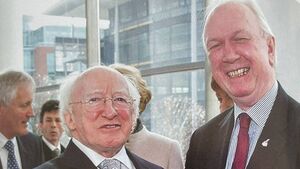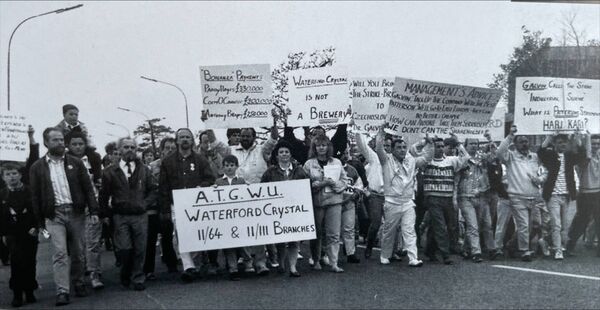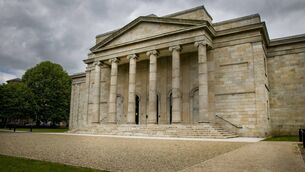A look into ‘the Glass’ and the global fight for workers' rights

President Michael D Higgins pictured with Jimmy Kelly.
Towards the middle of this book, Jimmy Kelly writes: “Where there is injustice, we should be prepared to show practical solidarity with the oppressed worker no matter where. In this regard, the workers of Waterford Crystal have been trailblazers, whether it was in supporting fellow workers on the island of Ireland, in Britain and beyond.”
Reading Jimmy’s book, you see a story of a man who has dedicated his life and work to holding up the rights and dignity of others across Ireland and abroad.
‘At the End of the Day’ is also not just the story of one man’s life but the story of Waterford City and its trials and triumphs.

Born to young mother Kitty in the 1950s, Jimmy was raised on Gas House Lane in "the shadow of the Waterford Gas Company".
From an early age, he was taught the value of socialist principles, particularly the work of Dr Noël Browne.
Waterford-born Browne tried valiantly to introduce the Mother and Child Scheme, offering free healthcare to mothers and children in Ireland.
Jimmy Kelly began work at the age of 15, leaving Mount Sion Secondary School to go to work as an apprentice glass-cutter at Waterford Crystal.
He writes: “Working-class school leavers no longer had to take the emigration route of our fathers and mothers and generations before them to England, Europe or the US. Instead we walked or cycled to factory jobs in our own home town.”
Jimmy vividly describes the influx of workers from Italy, Germany and Czechoslovakia who shared their skills with the local workers.
Two Czech men in particular, Miroslav Havel and Charles BaÄik, are highlighted for their work in re-introducing traditional cutting patterns from the Penrose Crystal times.
The book gives an invaluable inside look behind 'the Glass', from its start in 1783 with William and George Penrose, onto the re-birth flanked by BaÄik and Havel, during its heyday as one the best places to work in the country.
The calamitous fallout of 1990 job losses and the 2009 shutdown are recounted in vital, thorough detail.
The 2009 closure coincided with the global economic downturn, which Jimmy notes caustically: "In some ways mirrored the behaviour of senior managers in Waterford Crystal who were awarding themselves substantial bonuses at a time that the company was haemorrhaging cash."
Within the book, there are passages reflecting workers' solidarity across the whole of Ireland.
As the tremors of January 2009 reverberated throughout Waterford, Jimmy and fellow trade unionists showed strong support to fellow workers north of the border in Belfast and Antrim.
In May 2009, Jimmy and fellow Unite members gave support to former Ford-Visteon workers, who were occupying their factory in west Belfast.
In the North of Ireland, Jimmy met with then First Minister Peter Robinson over the proposed cuts and possible privatization of the local bus services.
Jimmy makes a plea for the importance of public ownership: “Since the 1980’s, fares have gone up and thousands of bus routes have been cut, leaving passengers stranded. Buses keep our cities moving and our countryside accessible to everyone.”
Reading this today, it is difficult not to be reminded of certain bus services in the Republic, especially in Waterford.
As a member of ATGWU, now known as Unite, Jimmy saw first hand how workers could be respected and protected by unions, not just in Ireland, but globally.
He wrote: "We were part of an influential union affiliated with Workers Uniting, which counted, among many others, the Los Mineros Union in Mexico, as well as the United Steel Workers in the United States and Canada."
In his role as Irish Secretary of Unite Jimmy has travelled to Columbia, meeting with fellow trade unionists, peace activists and workers.
Across the world, he sees the same problems; people suffering under the dominance of powerful corporations, senior management and decimation of worker's rights.
He writes down his experiences, not to merely reminisce, but to share lessons with the current and future generations:
"Now as I write, how will workers, pensioners and their families cope with the spiralling cost of living, and what about the rising generation who face an ever-deepening housing and accommodation disaster?
"Hence, the conclusions are intended to be a summary of workers fighting back in yesterday's, today's and tomorrow's world."






